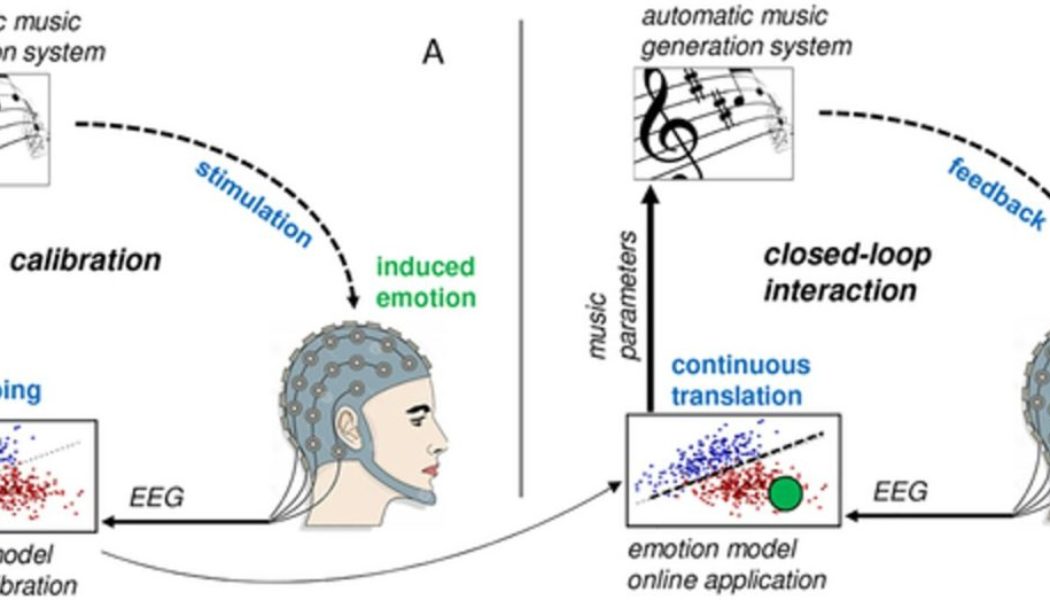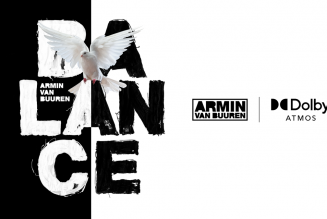Happy playlists, sad playlists, party playlists—any music fan knows that when it comes to setting the mood, there’s no better way than with a killer soundtrack.
Now, a pair of researchers from Germany and Singapore are taking this tenet to the next level with a brain-computer interface (BCI) that matches music to a user’s mood in real time. Ultimately, their goal is to teach listeners experiencing mental illness how to regulate and control their own emotions, they described in a recent interview.

Stefan Ehrlich from the Technische Universität München and Kat Agres from the National University of Singapore have developed a brain-computer interface for music-based emotion mediation.
PLOS ONE
According to Dr. Stefan Ehrlich, the technology uses neurofeedback to set the music’s rhythm, tempo, harmonic structure, and sonic “roughness” in order to “seamlessly and continuously” adapt to the listener’s emotional state. The tone of the music can then act as feedback for the listener as they attempt to adjust their moods.
Recommended Articles
“I want to emphasize that the system triggered people to engage with their memories and with their emotions in order to make the music feedback change,” Ehrlich said.
Researcher Kat Agres went on to describe music as a “Swiss army knife,” noting that its inherent properties lend themselves to health care applications like mental health and wellness. “It’s social, it’s engaging, it often evokes personal memories, and it often lends itself to rhythmic entertainment,” she listed. “It is meant to influence their emotional state, and helps teach the listener how to mediate their emotional states as they interact with the music system.”

Kat Agres discusses the BCI project at the Yong Siew Toh Conservatory of Music in Singapore.
Yong Siew Toh Conservatory of Music
Ehrlich and Agres have now started work on a 2.0 version of the system, which they are calling a Brain-Computer-Brain Interface. Once it’s undergone a series of tests, they plan to apply the project to stroke patients who are experiencing depression.
“The public currently perceives music predominantly as a medium for entertainment, but music has a much bigger footprint in human history than this. Historically, it’s served many important roles in society, from social cohesion to mother-infant bonding to healing,” Ehrlich and Agres reasoned. “We hope that music interventions and technologies such as our affective BCI system will contribute to this evolving landscape and provide a useful tool to help people improve their mental health and well-being.”
 [flexi-common-toolbar] [flexi-form class=”flexi_form_style” title=”Submit to Flexi” name=”my_form” ajax=”true”][flexi-form-tag type=”post_title” class=”fl-input” title=”Title” value=”” required=”true”][flexi-form-tag type=”category” title=”Select category”][flexi-form-tag type=”tag” title=”Insert tag”][flexi-form-tag type=”article” class=”fl-textarea” title=”Description” ][flexi-form-tag type=”file” title=”Select file” required=”true”][flexi-form-tag type=”submit” name=”submit” value=”Submit Now”] [/flexi-form]
[flexi-common-toolbar] [flexi-form class=”flexi_form_style” title=”Submit to Flexi” name=”my_form” ajax=”true”][flexi-form-tag type=”post_title” class=”fl-input” title=”Title” value=”” required=”true”][flexi-form-tag type=”category” title=”Select category”][flexi-form-tag type=”tag” title=”Insert tag”][flexi-form-tag type=”article” class=”fl-textarea” title=”Description” ][flexi-form-tag type=”file” title=”Select file” required=”true”][flexi-form-tag type=”submit” name=”submit” value=”Submit Now”] [/flexi-form]










Tagged: entertainment blog, GEAR + TECH, Mental Health, Moods, music blog, Neuroscience